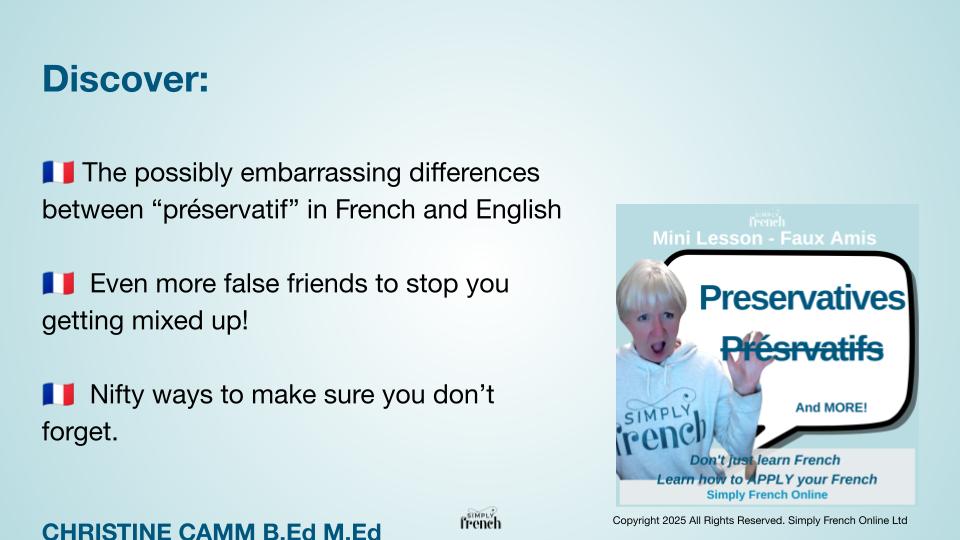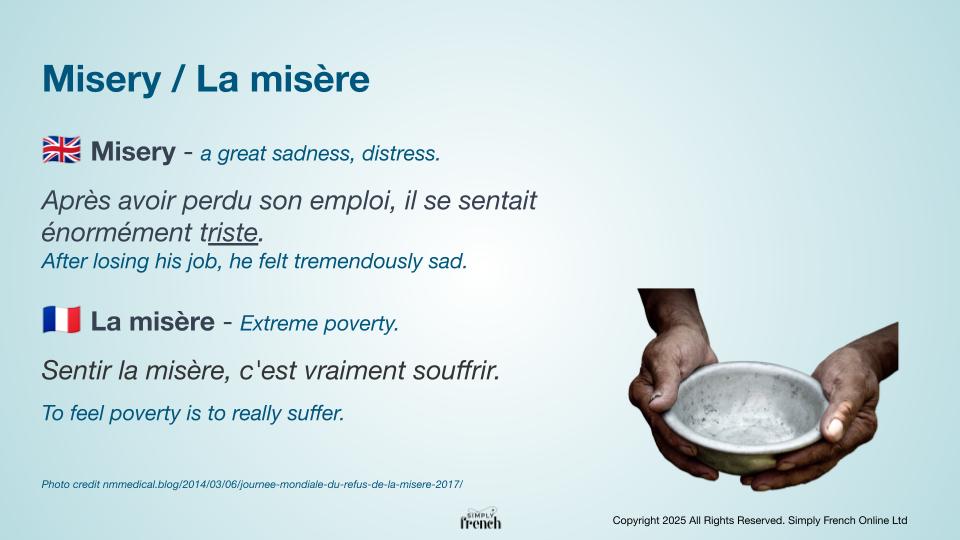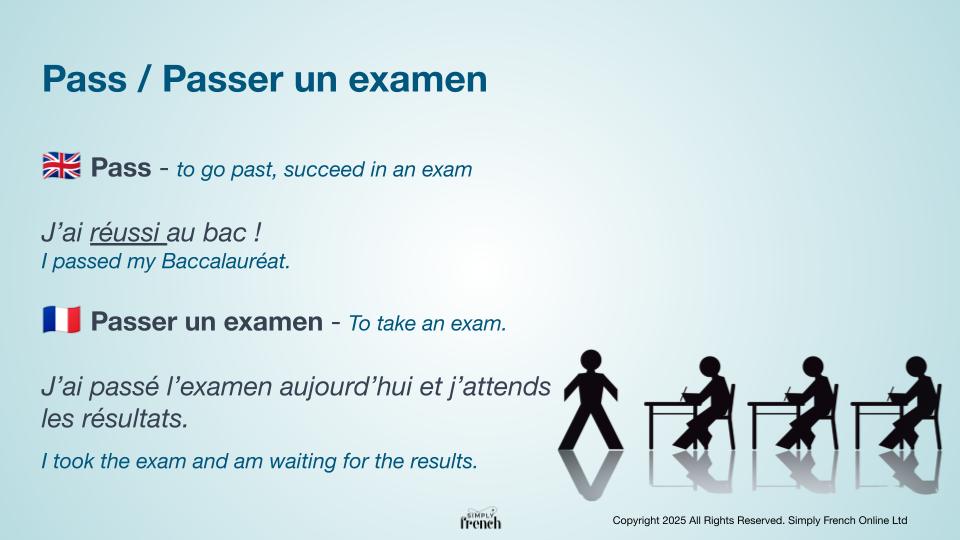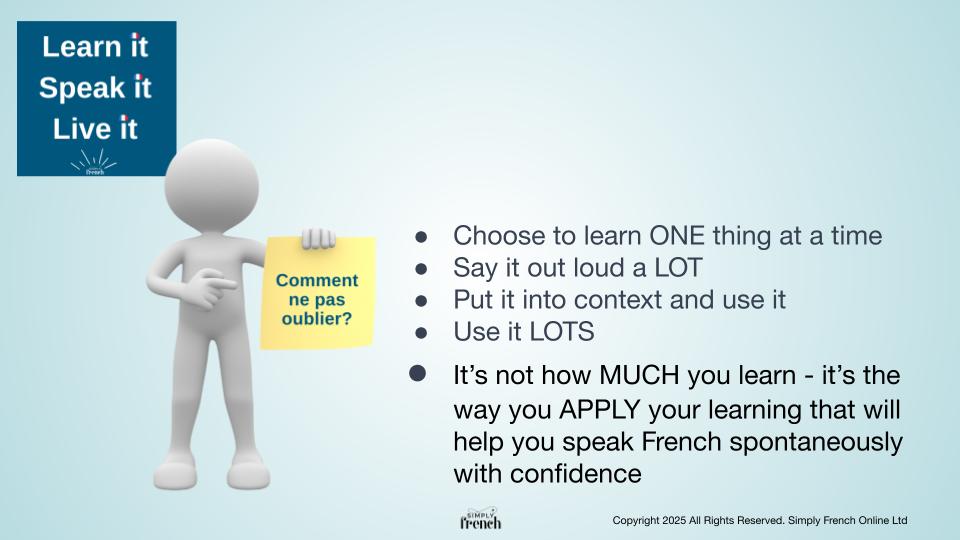What’s the difference between “préservatif” in French and “contraceptive” in English?
Aug 18, 2025Feeling sad? - Don’t say the wrong word in French! You might be saying you’re wretched!
Feeling hungry? - Watch out for condoms on your toast!
There are many words in French that generate a lot of laughter in your learning.
Because they are similar in looks does not mean they are similar in meaning!
Avoid saying you’re wretched or even eating condoms and check out this mini video for a more appropriate choice of words.
Today you will discover:
- The possibly embarrassing difference between “préservatif” in French and English
- Even more false friends to stop you getting mixed up!
- Nifty ways to make sure you don’t forget.

“Misérable” and “Miserable” differ in context.
Both are connected to sadness. Yet, the circumstances change:
- triste >>> miserable
- misérable >>> unfortunate
Let’s see them in context:
- Je me sens vraiment triste aujourd’hui. >>> I feel really sad today.
- Le livre “ Les Misérables” de Victor Hugo ne s’agit pas de gens tristes, mais plutòt de gens malheureux. >>> Victor Hugo’s “Les Miserables! is not about sad people but about most unfortunate people in tragic situations.

The same applies to the nouns:
- la tristesse >>> sadness
- la misère >>> extreme poverty
Here’s a way to use them:
- Après avoir perdu son emploi, il se sentait énormément triste. >>> After loosing his job, he felt tremendously sad.
- Sentir la misère, c’est vraiment souffrir. >>> To feel poverty is to really suffer.

This pair is tricky. They both involve a test or exam. However, the action is totally different:
- passer un examen >>> to take an exam
- réussir un examen >>> to pass an exam
Some illustrations for you:
- J’ai réussi au bac ! >>> I passed my Baccalauréat!
- J’ai passé l’examen aujourd’hui et j’attends les résultats. >>> I took the exam today and am waiting for the results.

These two are pretty close. Yet, there’s a nuance:
- faire semblant >>> to pretend
- prétendre >>> to claim
Here is how to use them:
- Il fait semblant d’avoir faim. >>> He’s pretending to be hungry.
- Il prétend qu’il est à l’heure. >>> He claims he’s on time. (It could be true).

These false friends are hilarious or they can put you in an awkward position:
- un additif >>> a preservative
- un préservatif >>> a condom
Have a look at these examples:
- Cette confiture est pleine d’additifs. >>> This jam is full of preservatives.
- Il n’y a pas de préservatifs dans la confiture. >>> There are no contraceptives in this jam.

Tips to learn false friends in French.
To start with, choose one thing at a time and master it. Once you do, you can add more to your list.
Then, say it aloud to memorise it.
The word is not enough. Indeed, if you put it into context with your own example it will facilitate.
Then, you want to practise as much as possible or you will forget it.
In a nutshell, there is no need to learn a lot. You would better apply your learning in order to speak French simultaneously with confidence.

In this mini-lesson, you have covered the following false-friends:
- triste >>> miserable vs misérable >>> unfortunate
- la tristesse >>> sadness vs la misère >>> extreme poverty
- passer un examen >>> to take an exam vs réussir un examen >>> to pass an exam
- faire semblant >>> to pretend vs prétendre >>> to claim
- un additif >>> a preservative vs un préservatif >>> a condom
Are you interested in learning more about false-friends? You may be interested in this mini-lesson:
What’s the difference between “Location” in French and “hiring” in English?
What’s the difference between “Habitudes” in French and “habits” in English?
Do you have any stories with false friends?
Free Masterclass
Learn my 4 step method of how to hold meaningful french conversations the R.E.A.L. way in just 30 minutes a day.
When you signup, we'll be sending you weekly emails with additional free content

